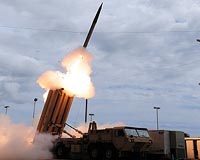 |
Tel Aviv, Israel (UPI) May 4, 2010 As Hezbollah builds up its rocket arsenal, Israel has asked Washington to help pay for more Iron Dome anti-missile batteries to shield the Jewish state. The Jerusalem Post reports that the Israeli Defense Ministry wants to buy more than a dozen batteries of the system designed to counter short-range missiles fired by the Iranian-backed Lebanese guerrillas and Palestinian Hamas militants in the Gaza Strip. The ministry had allocated $250 million for the development of the system, the bottom layer of a planned three-tier missile defense shield, and the purchase of two batteries. Each Iron Dome battery costs around $25 million, so buying an extra dozen would total at least $300 million, possibly more. That would be on top of the $3 billion Israel gets in U.S. military aid every year. Iron Dome, built by state-owned Rafael Advanced Defense Systems, employs an advanced radar, made by Elta Systems, that locates hostile rocket launches and tracks the projectiles for a kinetic interceptor called the Tamir. The system can determine which missiles will miss military positions or civilian targets and ignores them to focus on those with more dangerous trajectories. The Jerusalem Post said the ministry has also approached the U.S. Department of Defense for additional assistance to fund the project. The Pentagon provided the bulk of an estimated $2 billion required to develop the more powerful Arrow missile, which is designed to shoot down ballistic missiles at high altitude and long range. The Arrow-2 is currently deployed and constitutes the top layer in the planned defense shield. "Congress has traditionally approved a special budget for the development and procurement of the Arrow missile defense system," The Jerusalem Post observed. "Last year, for example, the Pentagon allocated a special budget for the development of the Arrow-3 now under way by Israel Aerospace Industries and the Boeing Co." The newspaper quoted one defense official as saying: "This is an issue that we've discussed with the Americans already on several occasions. "The logic from an American point of view is that it's better to help Israel feel protected and defend its cities than it is for Israel to be under attack and have to launch another operation in Gaza to protect itself." The first Iron Dome battery became operational several weeks ago. The original intention was to deploy it in the southern Negev Desert to counter short-range Katyusha and Grad rockets unleashed by Hamas. But as tensions swelled in the north amid a major arms buildup by Hezbollah, the military reportedly decided it was more prudent to deploy Iron Dome along the Lebanese border. The move toward procuring another dozen or more Iron Dome batteries has emerged amid Israeli claims in February that Hezbollah has acquired an unspecified number of Fateh-110 surface-to-surface missiles from Syria. This road-mobile weapon has a range of 156 miles, which means it can reach just about every city and major town in Israel. The ballistic system uses solid propellant, which means it can be launched in an instant, which makes detection, and retaliatory fire, difficult. The 3-ton missile carries a half-ton warhead. It is unlikely that Iron Dome would be able to counter this threat. But the system that is intended to do that, known as David's Sling, is still being developed and is unlikely to be operational for another two years or so. It's not clear whether the Israeli Defense Ministry will also seek extra U.S. funds to develop that system. No figures for that project's budget has been published. But officials note that the Iron Dome budget soared by more than 40 percent in the final 10 months of that system's development. The capabilities of these various anti-missile systems have come under increasing question in recent months amid the realization that in the event of war with Iran, Israel will come under a sustained missile bombardment on an unprecedented scale by Iran, Hezbollah, Hamas and probably Syria as well. This would involve the short-range Katyushas and Grads all the way up to Iran's Shehab-3b intermediate-range ballistic missiles, with every part of the country vulnerable to attack. Israel claimed in April that Syria has provided Hezbollah with Soviet-era Scud ballistic missiles with a range of 200 miles. There has been no conclusive proof of that but, even so, Israeli jitters have gotten worse.
Share This Article With Planet Earth
Related Links Learn about missile defense at SpaceWar.com Learn about nuclear weapons doctrine and defense at SpaceWar.com All about missiles at SpaceWar.com Learn about the Superpowers of the 21st Century at SpaceWar.com
 LockMart Receives THAAD Field Support Contract
LockMart Receives THAAD Field Support ContractDallas TX (SPX) Apr 26, 2010 Lockheed Martin has been awarded an Indefinite Delivery Indefinite Quantity (IDIQ) contract, with initial funding of $25.7 million, to provide support for the U.S. Army's fielding of the Terminal High Altitude Area Defense (THAAD) Weapon System. The IDIQ contract consists of a four-year basic contract with five additional one-year options. The total maximum contract value is $435 million through ... read more |
|
| The content herein, unless otherwise known to be public domain, are Copyright 1995-2010 - SpaceDaily. AFP and UPI Wire Stories are copyright Agence France-Presse and United Press International. ESA Portal Reports are copyright European Space Agency. All NASA sourced material is public domain. Additional copyrights may apply in whole or part to other bona fide parties. Advertising does not imply endorsement,agreement or approval of any opinions, statements or information provided by SpaceDaily on any Web page published or hosted by SpaceDaily. Privacy Statement |